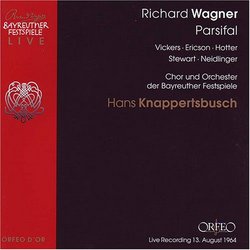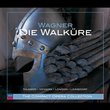| All Artists: Richard [Classical] Wagner, Hans Knappertsbusch, Bayreuth Festival Orchestra, Anja Silja, Barbro Ericson, Dieter Slembeck, Dorothea Siebert, Else-Margrete Gardelli, Erwin Wohlfahrt, Gerd Nienstedt, Gustav Neidlinger, Hans Hotter, Heinz Hagenau, Hermann Winkler, Jon Vickers, Liselotte Rebmann, Rita Bartos, Ruth Hesse, Sylvia Lindenstrand, Thomas Stewart Title: Wagner: Parsifal Members Wishing: 1 Total Copies: 0 Label: Orfeo D'or Release Date: 10/30/2007 Album Type: Import Genre: Classical Style: Opera & Classical Vocal Number of Discs: 1 SwapaCD Credits: 1 UPC: 675754002671 |
Search - Richard [Classical] Wagner, Hans Knappertsbusch, Bayreuth Festival Orchestra :: Wagner: Parsifal
 | Richard [Classical] Wagner, Hans Knappertsbusch, Bayreuth Festival Orchestra Wagner: Parsifal Genre: Classical
|
Larger Image |
CD DetailsSimilar CDs |
CD ReviewsKNA's last Stand. The end of an era. His final Parsifal Ryan Morris | Chicago, IL | 10/29/2007 (5 out of 5 stars) "KNA's connection with Parsifal spans almost fifty years, and on record begins with his 1942 Act III issued on Music and Arts)with surprisingly fleet tempos), through the fifties, to his legendary 1962 stereo account on Philips, and culminating in this 1964 Parsifal, KNA's last stand and the end of an era-his final Parsifal. This Parsifal, at last count I have KNA's 51,52,54,56,60,62 and now this one(along with about twenty other versions). My overall favourites have long been the 1954 due to Josef Griendl's uncomparable Gurnemanz and Hans Hotter's magnificent Amfortas, perhaps the wisest interpretation of the role on record-though overall I prefer london and the 62 philips kna. This version is similar to that storied 62 version with one major upgrade, John Vickers as Parsifal. Jess Thomas in the 62 isnt bad, in fact, I think he is close to great, but this is Vickers show. He proves once again that he may be the most subtly intense Heldentenor since Melchoir, well deserving of the title passed down from Windgassen. Another unexpected delight, as in 1960, Thomas Stewart takes over as Amfortas. I dont believe he compares with Hotter or London, but his interp is vastly superior than today's Weikl or Hampson. Hotter is also surprising fine, though there is evidence of his soon-to-occur vocal demise. This was relatviely near to his debacle as Wotan in the Solti cycle so I was surprised at how well he sounded, though his 62 performance(in stereo) is still to be preferred. Finally, KNA is the star of the show. I have long loved the ability to study his changes over time with this score. From the 1942 act III issued on Music and Arts(more similar to this than his 50's perf), through the profound and glacial fifties, on to the his 60 performances, which culminate in this 1964, his last Parsifal at Bayreuth and as a conductor. It is truly aweinspiring the accumulation of wisdom he has gained over this 22 year, 60 plus performance stretch. His tempos went from hasty, to glacial, to moderate, to fleet but never rushed. And the detail will never be rivalled, not even by Krauss in 53 or Boulez(which was recorded prior to his fine tuned abilities). Just listen to the opening prelude and revelation after revelation await those who are familiar with the work. Turn on your 1954 version and listen to how the flutes were brazen then, but now subtlely hint at a vindication. I would not recommend this as a first buy or introduction to parsifal, that goes to his 1962 stereo version on philips. Then I would return to his 1954 version on Archipel, my overall favourite. This perf is very good but would be recommended more toward those who adore this piece as I do. Vickers parsifal needs to be and is my second favourite interp of that character to Jerusalem with barenboim. For those beginners, I would recommend Solti, Kubelik, or Barenboim." Vickers is a great Parsifal, and the sound is cleaned up Santa Fe Listener | Santa Fe, NM USA | 01/30/2008 (5 out of 5 stars) "So far as the performance goes, I have nothing to add to the long review below. I'm not quite over the moon about Knappertsbusch, but his reputation rests on his long devotion to Parsifal, which became a signature work. The chief attraction here isn't his conducting -- not for me, at least -- but Vickers' famous Parsifal. The great tenor performed relatively few roles, and this is his only Parsifal on record. I am also a fan of Thomas Stewart, whose Amfortas is memorable, and Hotter was in surprisingly steady voice this late in his creer.
Another point is that Orfeo, taking advantage of its special relationship with Bavarian Radio, gives us a clean, original version in place of the previous pirated ones. However, the remastered sound on my Melodram set is actually firmer and closer than what we get here. Both are mono. I don't think it's a cut-and-dried choice between the two unless you simply must have fthe original." |

 Track Listings (12) - Disc #1
Track Listings (12) - Disc #1

![Wagner: Der Ring des Nibelungen [Box Set]](https://nationalbookswap.com/cd//m/08/2808/6132808.jpg)